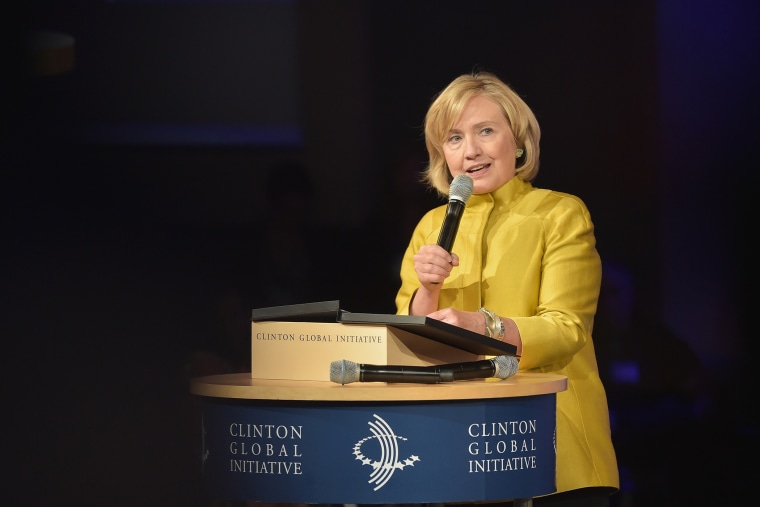There’s a midterm election looming, the lame duck president is a drag on his party, which doesn't want to be seen with him, and Hillary Clinton is gearing up for a potential presidential run by helping some Democrats. It's 2006 all over again.
This year’s midterm election is shaping up to look a lot like the 2006 version, but with the parties reversed. In 2014, it’s Democrats, not Republicans, who are in trouble, which adds another complication to Clinton’s delicate planning ahead of a likely second presidential run.
Clinton will headline a rally Thursday evening in downtown Philadelphia for Pennsylvania gubernatorial candidate Tom Wolf, her first public fundraiser of the year. The day before, she attended a closed-door fundraiser in Chicago for Gov. Pat Quinn.
Why the difference? It might have to do with the fact that Wolf is currently ahead by double digits, while Quinn is hanging on for his life.
Unfortunately for Democrats, there are a lot more Quinns this year than Wolfs. So while there are plenty of eligible winning candidates for Clinton to back in 2006, it’s trickier now. She needs to thread the needle of helping Democrats while not contaminating her political standing with their losses.
And Clinton doesn’t have to look far to see the risk.
Earlier this year, before she really got back into politics, Clinton made an exception for Marjorie Margolies, who was running in a Democratic congressional primary in Pennsylvania. Not only is Margolies Chelsea Clinton’s mother-in-law, but she cast a painful vote for Bill Clinton’s 1993 budget during her first stint in the House, which ultimately cost her her seat and won her a debt from the Clintons.
Margolies lost her race this year, leading to a spate of negative media coverage and Republican attacks about the apparent withering of the Clinton brand. If she can’t win a congressional primary, the argument went, how can she win a presidential one?
Margolies herself captured the predicament the Clintons face in an interview with CNN back in May. "We always knew that if they came in too much we would be blamed for their coming in too much. If they don't come in enough that people would would say they didn't come in enough,” she said. “You're kind of damned if you do, damned if you don't.”
When expectations are as high as they are for anything she does, Clinton can’t afford to be seen backing a loser. At the same time, Clinton wants to help her party and needs to be seen doing it, lest she get accused of looking out only for herself.
Clinton’s solution, tucked away in the campaign scheduled revealed to Politico last week, seems to be this: Mostly private fundraisers for a limited number of key races where she can make a difference and -- importantly -- where the Democratic candidate has a good shot at winning.
Clinton is intervening in most of the key Senate and gubernatorial races this year, but not all.
She’s not, for instance, backing West Virginia’s Natalie Tennant, nor Louisiana Sen. Mary Landrieu, nor Arkansas Sen. Mark Pryor, though her husband has campaigned for all three. Nor is she supporting Alaska Sen. Mark Begich, one of the party’s most endangered incumbents. All four are currently underwater in the polls.
The candidates she is supporting, like Kentucky's Alison Lundergan Grimes or North Carolina Sen. Kay Hagan, face very difficult battles, but are generally in stronger positions.
Even so, she has avoided public events this far. Some advisers have encouraged her to get out with voters more this year, both to combat impressions that she’s remote, and to warm up for a presidential bid. She enjoys these interactions, they insist, and gleans information from them that she doesn’t find in polls or from consultants. During the “listening tour” of her first Senate campaign, aides often scheduled an hour after public events for Clinton to mingle with locals.
But there’s little glad-handing so far this campaign season. Closed-door events may just be safer, as the privacy helps insulate Clinton from potential losses.
And to be sure, Clinton is invaluable to her party at these kinds of events. In 2006, Clinton raised millions for party committees, and her personal leadership PAC doled out almost $2.5 million to other Democrats, even though she had her own re-election campaign to worry about.
Clinton did work the rope line after her speech at the Iowa Steak Friday last month, and was well received, but the event mostly honored retiring Sen. Tom Harkin, rather than a specific candidate.
Clinton can stride confidently on stage Thursday in Philadelphia knowing that Wolf is a shoo-in to oust unpopular Republican Gov. Tom Corbett (the latest poll has him down 17 points) in the key presidential swing stage.
